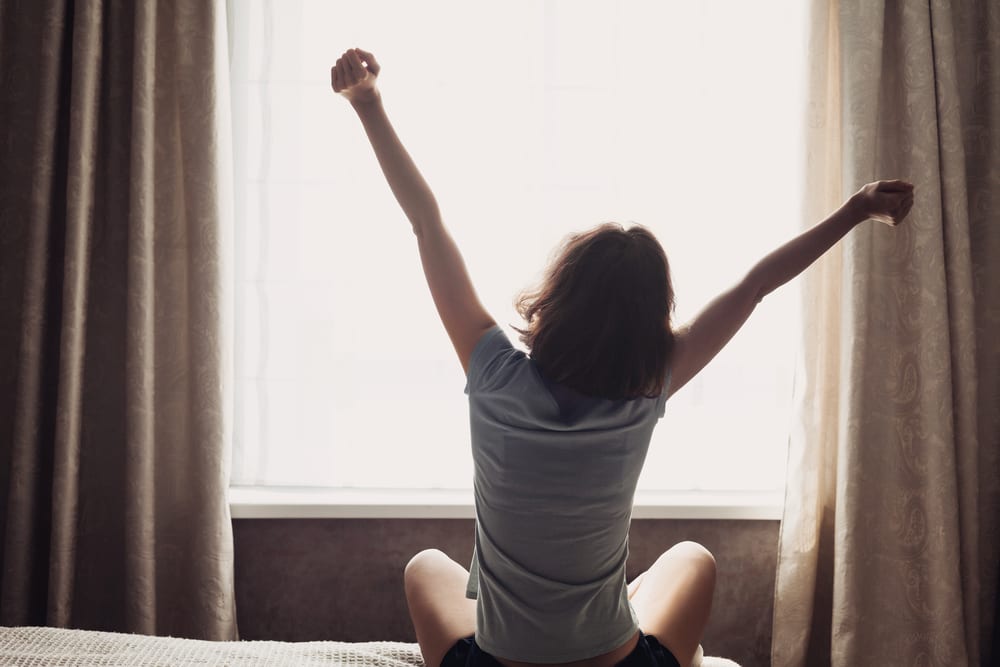I was convinced I wasn’t a morning person. It was set in stone in my brain and there was no telling me otherwise. I had tried to be that chirpy person who greets sunrise with a smile and does 3 laps of the local park before sitting down to a leisurely breakfast, but nothing seemed to work.
The mornings for me would involve hitting snooze over and over again until I finally had to drag myself out of my zip and link bed and start my morning, bleary-eyed with a slump. I told myself it was genetic (and maybe it is) – all my family are late risers and I was generally accustomed to rushing around starting my mornings in a chaotic manner because that seemed preferable to dragging myself out of bed any earlier.
Hating the mornings for me, just meant I was living for the weekend, for the time when, come Saturday, I could get those few extra hours under the duvet and crawl out of bed onto the sofa to watch my favourite morning shows without having to withstand the crippling sound of my alarm.
But this had to change. Getting increasingly busier with work, I needed to make full use of the mornings and I was tired of feeling exhausted first thing and achieving very little. I had read article after article about how mornings were the best time for productivity, for workouts, for working blissfully without disturbances and for ticking those difficult tasks off your to-do list. The most successful people in the world were all morning people and early-rising seemed to be intrinsically linked with success.
So I bought a book and I read countless blogs and articles about how to transform myself into a morning person and I’d like to tell you, it is possible. I now rise at 6am everyday and I use the extra time for a daily meditation, a workout and my planning for the day.
What I realized is that aside from various rituals and habits that help this process, most of it is in the mindset. If you go to bed with the expectation that you’re going to wake up exhausted, that you won’t get enough sleep or that you are dreading the moment your alarm goes off, guess what? Those things will turn out to be true. The mind is a very powerful tool and anything we continuously tell it, usually ends up manifesting itself as the truth.
We need to send different messages to our brain about the mornings, positive affirmations that reinforce the philosophy that mornings are a magical time full of peace and tranquility and we can use them to our advantage to achieve things we wouldn’t usually have time for.
Now listen carefully: the snooze button is the devil! All it does is prolong that groggy feeling and tricks your brain into thinking it will get more sleep, when in reality you’ll be dozing in and out of consciousness whilst putting off starting your day. As I mentioned, I was a serial snoozer and now I don’t even hit it once on a workday. It’s painful, yes, but if you jump out of bed as soon as your alarm goes off, you’ll notice the difference. And it’s only a very brief moment of pain versus an entire morning feeling sleepy and grumpy. It’s a fair trade off.
With the extra time you’ve created with your mornings I would recommend using it to do those tasks that you never seem to find time for and are not necessarily work related. Instead of catching up on your emails, filling the inboxes of others before they get to their desks, use these valuable quiet hours of the day as ‘me time’ whether that’s exercising, learning a language, reading, writing, planning and goal setting or anything else you might find worthwhile.
There are many other tips and tricks people use to get themselves up in the mornings, whether that’s putting your alarm clock across the room, drinking a large glass of water immediately on waking or setting your coffee machine on timer so you’re tempted by the smell of fresh coffee. But mostly, I believe, it’s in the mindset. Change your attitude about the mornings and you’ll see a massive transformation. Let yourself be excited about the things you can do with the extra time and you’ll find that energy and positive attitude carries throughout the day and the dread you used to feel about the sound of your alarm gradually evaporates.
There are so many various theories about how much sleep we need or should get every night. Some of the most successful individuals throughout history have not only survived, but thrived on four or five hours a night. But there are many medical professionals and sleep experts who believe a minimum of seven to eight hours is required to be able to function at your optimal level and maintain a healthy lifestyle. Lack of sleep can be linked to problems such as over-eating and depression so a good night’s sleep, in my opinion, is not to be undermined. Try and find your own personal comfort level here; mine is seven hours but I can do ok on six to six and a half. Some people need eight and that’s ok too, maybe you need to sacrifice an hour of late-night TV watching or that last glass of wine in the pub to make the mornings work for you but I think the benefits are really worth it.
Give it a try and stick at it for at least a month to see how your day can be transformed by giving yourself an extra hour in the mornings. If you can get into the habit of early-rising and really make use of that time, I assure you, the snooze button won’t look so tempting anymore.
Image: Morning person via Shutterstock

